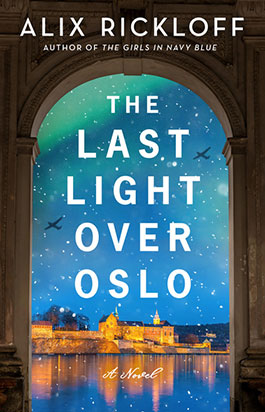The Last Light Over Oslo

August 2024
William Morrow
Based on true events, this gripping historical novel set in Norway and Sweden in 1940, follows one of the first female US Ministers, Daisy Harriman, and her fictional niece as the two are unexpectedly caught up in the German invasion of Norway.
Cleo Jaffray was an American. A war in Europe had nothing to do with her. She told herself that right up until the man she loved went missing in Poland and Cleo was forced to turn to the only person who might be able to help—her aunt Daisy, the US Minister to Norway.
Daisy Harriman has never shied away from a challenge, be it canvassing for women’s suffrage or driving Red Cross ambulances in WWI, so as only the second woman ambassador, she is determined to prove the naysayers wrong and succeed in her post. When her disgraced niece Cleo lands on her doorstep, penniless and demanding help to find her lost lover, Daisy must balance her responsibilities as a diplomat with her desire to help her family.
Their search for answers is interrupted when Germany invades Norway and the two of them find themselves on the run in a countryside that is quickly becoming a battleground. Then as Daisy is given the task of escorting the Norwegian Crown Princess and her young children to America, Cleo’s lover resurfaces with a story that doesn’t add up and dangerous enemies on his trail.
This riveting historical novel, based on the astounding life of Daisy Harriman and a real-life royal rescue, vividly captures a desperate time and a fearless heroine.
March 1940
Oslo, Norway
“Velkommen til Oslo, Frøken Jaffray!”
Cleo winced at the young woman’s perky salutation as she handed back Cleo’s papers. It was far too early in the day. Cleo had had far too little sleep. And the dangerous steamer crossing from Hamburg dodging British mines had left her pea green with seasickness and jumpy with nerves. She put her passport and travel documents away carefully, taking time to guarantee they would be safe. Papers were more valuable than gold these days. “Takk,” she mumbled. “Thanks.”
The woman smiled wider. “You are American?” She switched to English, her accent thick but understandable. Thank heavens. Cleo knew exactly three phrases in Norwegian, gleaned from looking over the shoulder of a fellow traveler with a guidebook—thank you, please, and I do not understand.
“That’s right.” Cleo wobbled as the ground under her feet continued to sway ominously, her stomach rising into her throat. She and boats had never been friends. Not as a girl in Newport retching over the side of the very eligible Jimmy van Speakman’s sporty little ketch. Not now with tons of steel and three decks between her and the Baltic. If there had been any other way to get to Oslo, she’d have taken it in a shot. Train, taxi, horse-drawn sledge. But she was broke, her purse containing only a tiny jumble of various coins and none of them adding up to enough for anything but the price of a third-class steamer ticket. If only the necklace she wore was real, she might have arrived in style trailing her luggage with a handsome young porter to help her. But the pink costume diamond, while gaudily pretty, wouldn’t even buy her a sandwich and a cup of coffee from the steamer’s canteen. Still, it meant more to her than any treasure from Tiffany’s. “Can you tell me how to get to the US legation?”
Immediately, the woman sobered as if suddenly noticing Cleo’s scuffed and mismatched luggage, her worn coat with the matted fur collar, and her general air of nervous tension that had only grown worse since she’d left the Hungarian city of Kassa alone and nearly broke. No doubt, she wasn’t the first American caught out by this ridiculous war that the customs clerk had come across. But at least here she was safe. Norway was neutral, like the US. There would be no checkpoints. No daily humiliations. No smirking soldiers whispering sordid invitations one always risked turning down.
“There is a taxi stand outside,” the woman said already starting to turn away to the next passenger.
Being rushed through the weather in a warm dry taxi sounded the height of luxury, but even stretched, Cleo’s coins wouldn’t be near enough. “And if I decided to enjoy a nice walk to clear my head? How far would it be?”
The woman snuck a glance out the windows of the terminal to where a cold sleet slanted like needles from a slate gray sky. She chewed her lip for a moment before digging in her pocket. “Here.” She handed Cleo a few banknotes. “Take this.”
Once pride would have prevented Cleo from stooping so low as to accept a handout. Not anymore. It was amazing what poverty and fear did to one’s vanity. She’d learned to live with the poverty, but she’d never grown used to the fear. Even now, the copper tang of it seemed to settle at the back of her throat, sit like a stone in her stomach. She rubbed her arms as if she could wipe herself free of it.
“Takk,” she repeated. “Takk very much,” and hurried out onto the sidewalk in case the generous official changed her mind.
Outside, the sleet numbed her cheeks while the March damp gnawed into her bones. She thought New York winters were harsh. Scandinavian springs were ten times worse. She shrugged deeper into her hand-me-down coat. Not much farther, and she could finally rest. At least that was the hope she’d carried with her the last few weeks.
Aunt Daisy would help her.
Aunt Daisy would find Micky.













